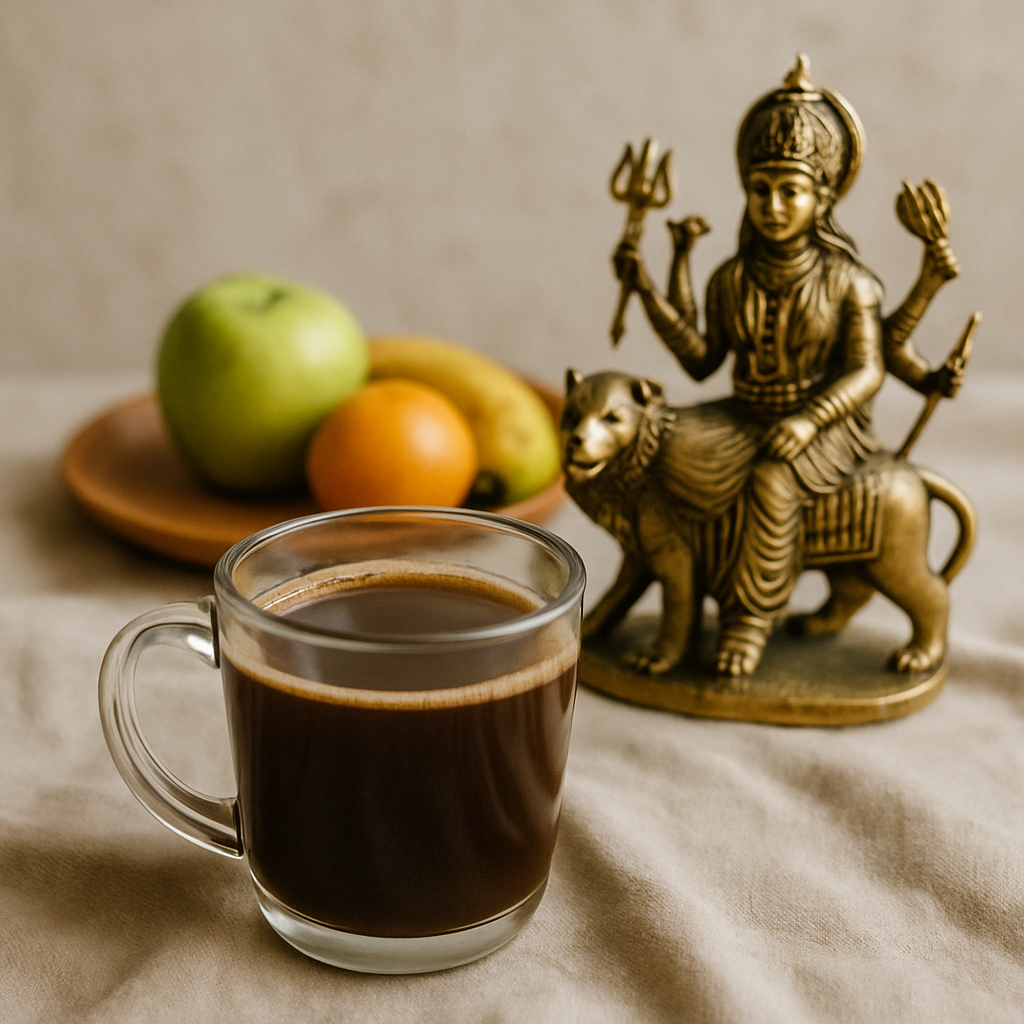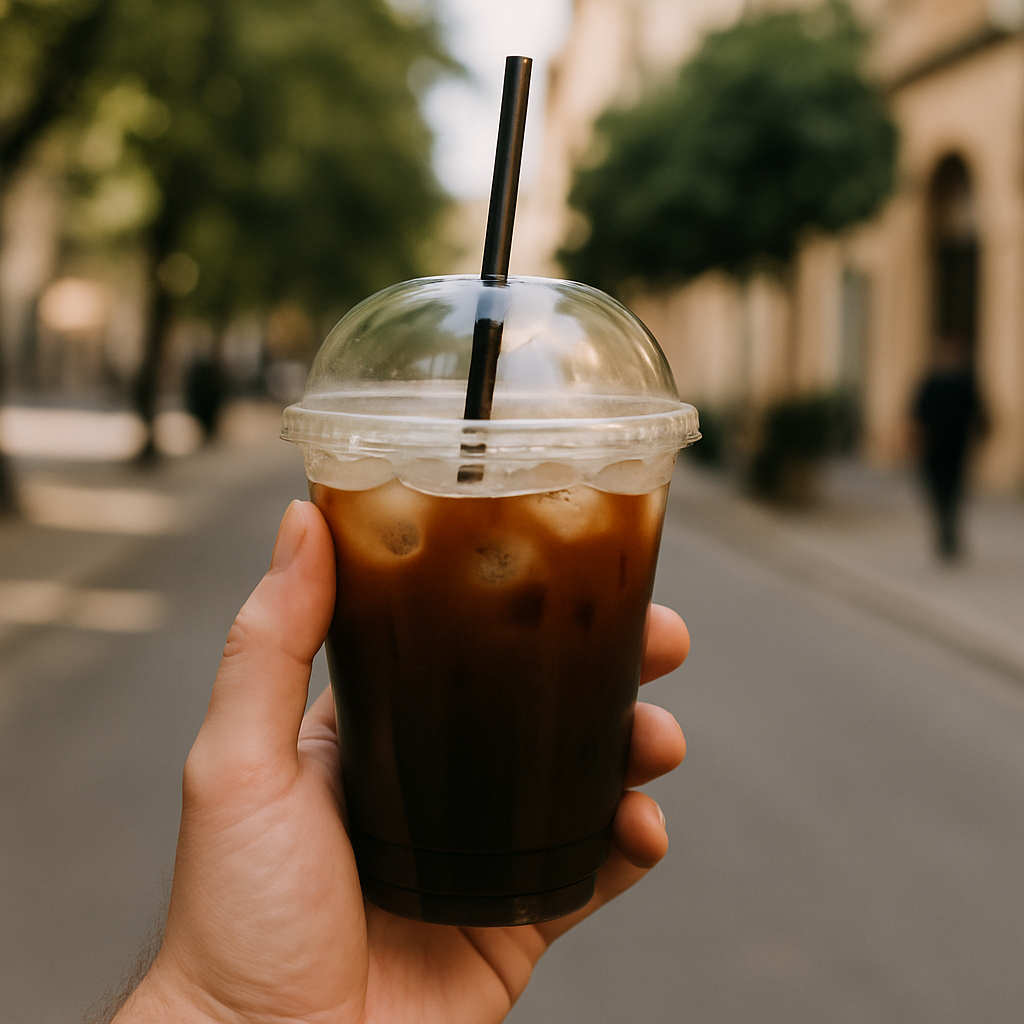Ask Ayurvedic doctor a question and get a consultation online on the problem of your concern in a free or paid mode. More than 2,000 experienced doctors work and wait for your questions on our site and help users to solve their health problems every day.
Can We Drink Coffee in Fast? What Ayurveda and Traditions Say

Fasting is a deep-rooted spiritual and health tradition in many cultures, especially in India. From Navratri to Sawan, Janmashtami to Karwa Chauth, each fast carries unique rituals and restrictions. But there’s one modern-day dilemma that many people keep asking—can we drink coffee in fast? Or to be more specific, can we drink coffee in Navratri fast, can we drink cold coffee in fast, or even can we drink coffee in Sawan fast?
These questions pop up more and more as people blend traditional practices with modern lifestyles. With coffee being such a daily essential for so many, understanding its place during fasting—especially from both an Ayurvedic and religious lens—is important. In this guide, we’ll explore whether coffee breaks a fast, when it might be allowed, and healthier, ayurvedic alternatives you can sip on without guilt.
Let’s dive in.
Coffee and Fasting: The Basics
Fasting, by definition, typically involves abstaining from food and sometimes beverages for a specific period. But when you’re doing a religious fast—say during Mahashivratri, Ekadashi, or Monday fasting—rules can differ quite a bit. So… in fast, can we drink coffee?
The answer isn’t just black and white. It depends on the type of fast, its purpose, and whether you’re following a religious, detox, or intermittent fasting routine.
Ayurvedic View on Coffee During Fasting
Ayurveda doesn't exactly praise coffee. It's considered rajasik—stimulating, agitating—and not exactly ideal during a fast when the goal is to center the body and mind. Coffee can disturb digestion and even irritate agni (digestive fire), especially when consumed on an empty stomach. Ayurvedically speaking, it's often discouraged during fasting, particularly the milk-based types.
Still, people do reach for it. Why? Because, let’s be real—those caffeine withdrawal headaches are no joke.
Does Coffee Break a Fast from a Digestive Perspective?
Here’s the thing. From a digestive or calorie-centric standpoint, black coffee typically doesn’t break a fast. It contains very few calories and no macronutrients that trigger digestion. So technically, if you’re on a calorie-based fast (like intermittent fasting), black coffee may be okay.
But when you add milk, sugar, or drink cold coffee with cream—yes, that’s different. Can we drink milk coffee in fast? Not if you’re sticking to strict fasting principles.
Types of Coffee (Black, Cold, Milk) and Their Impact
-
Black Coffee: Usually acceptable in calorie-restricted fasts, but may not align with spiritual fasts like Karwa Chauth or Janmashtami.
-
Cold Coffee: Hmm. Cold coffee often contains milk and sugar. Can we drink cold coffee in fast? Depends on how strict your fast is. If you’re observing Navratri, it’s probably a no.
-
Milk Coffee: This is where most people get confused. During some fasts, milk is allowed—but combining it with coffee might not be seen favorably.
To sum up this section: if you’re fasting for health, black coffee might be okay. If you’re fasting for religious reasons, you’ll need to be more cautious—and consult family customs or spiritual advisors when in doubt.

Don't wait or self medicate. Start chat with Doctor NOW
Can We Drink Coffee in Popular Indian Fasts?
Different Indian fasts come with different guidelines. Some are super strict—like Karwa Chauth, where even water isn’t allowed until moonrise—while others like Thursday fasts or Monday fasts are more lenient. Let’s look at what traditions say when it comes to drinking coffee in various common fasts.
During Navratri, many people refrain from consuming grains, salt, and certain spices. But can we drink coffee in Navratri fast? Technically, black coffee isn't a grain, but it is still considered tamasic in some traditions. And cold coffee? That’s trickier. Can we drink cold coffee in Navratri fast? Not usually—mainly because of the milk, sugar, and additives.
In Sawan fasts, especially observed on Mondays in honor of Lord Shiva, the same logic applies. People often ask, can we drink coffee in Sawan fast or can we drink coffee in Monday fast? If milk is allowed in your fast, you might be able to have milk coffee. But it's always best to avoid stimulants during spiritually motivated fasts.
And then there's Janmashtami—fasting on Lord Krishna’s birthday is considered a full-day vow. Typically, water, fruits, and milk are allowed. But can we drink coffee in Janmashtami fast? Traditionalists would say no. Again, coffee isn’t considered a sattvic food.
Moving on to Mahashivratri and Ekadashi—two powerful fasting days in the Hindu calendar. Both have deep spiritual significance. So can we drink coffee in Mahashivratri fast or can we drink coffee in Ekadashi fast? Not likely, unless you're doing a more relaxed version of the fast. And let’s not forget Thursday fasts, often kept for prosperity. Can we drink coffee in Thursday fast? This depends on regional customs, but it’s not commonly encouraged.
Lastly, can we drink coffee in Karwa Chauth fast? Short answer: no. This is a sun-up to moonrise fast with no intake of food or water, so coffee is completely off the table.
Cold Coffee in Fasts: Is It Treated Differently?
Can we drink cold coffee in fast—especially compared to black coffee? Cold coffee, typically made with milk and sugar, is more of a dessert beverage than a simple drink. In most Indian fasts, unless you're only avoiding grains and spices (and not milk or sugar), it’s a no-go. It can also feel heavier on the stomach, especially when you're fasting and digestion is slower.
So even though it might feel refreshing, it’s not recommended. And, of course, in a stricter fast like Karwa Chauth or Ekadashi, cold coffee is definitely not on the allowed list.

Can We Drink Coffee So As Not To Break a Fast?
Let’s face it—some people really can’t function without that morning brew. So the question is: can we drink coffee in fast without technically breaking it? Well, that depends on who you're asking—your body, your tradition, or your guruji.
Religious vs Ayurvedic Interpretations
Religiously, the answer varies. For instance, in a strict Janmashtami fast, or a Karwa Chauth fast, even water is off-limits, let alone coffee. But in more relaxed fasts like those on Monday or Thursday, coffee may be allowed in moderation—especially if it's milk-based and aligns with your family’s version of the rules.
Ayurveda, on the other hand, looks at energy and balance. Coffee—especially black—can spike vata and pitta, leading to irritability, anxiety, or acid reflux, particularly on an empty stomach. Milk coffee is slightly better because it grounds the caffeine hit, but again, Ayurveda isn’t exactly throwing a parade for your cappuccino.
Still wondering: in fast, can we drink coffee? Sometimes yes, sometimes no. It depends more on why you’re fasting, and what your body (and tradition) allows.
When Is Coffee Considered Acceptable?
If you're doing intermittent fasting for health or weight loss (not for religious reasons), black coffee is usually considered fine. It doesn’t significantly raise insulin or break the digestive rest state.
In spiritual or religious fasts, though, the rules tighten. But you might find that some people still sip coffee during Navratri or Monday fasts, especially when they’re doing "upvaas" that allows fruits and milk.
So technically, can we drink milk coffee in fast? If your fast allows dairy, and if you're okay with stimulating your system a bit—yes, maybe. But don’t overdo it. Too much caffeine on an empty stomach can actually mess with your fast’s intended benefits.
Ayurvedic Alternatives to Drinking Coffee During Fasting
Feeling deprived without your caffeine fix? Here’s the good news—you don’t need to suffer. Ayurveda offers several gentler alternatives that can keep you feeling alert without the jittery spike.
Caffeine-Free Options That Don’t Break the Fast
-
Lemon water with rock salt (if salt is allowed)
-
Warm water with tulsi or mint
-
Roasted jeera (cumin) water
These don’t just hydrate—they gently stimulate digestion and detox without overactivating your nervous system.
Herbal Teas, Warm Water, and Fasting Balancers
Herbal teas like ginger, coriander, or cinnamon teas are warming and soothing. They help keep your metabolism stable and reduce cravings.
One underrated gem: warm water with a pinch of dry ginger powder. It’s calming and can settle your tummy if you’re feeling the fast too hard.
If you're fasting and still craving that bitter-sweet hit, try chicory-based coffee substitutes. They're caffeine-free, taste similar to coffee, and won’t break your fast (unless sweetened too heavily!).
Conclusion
So, circling back—can we drink coffee in fast? It’s not a simple yes or no. If you’re fasting for health, a plain black coffee might be fine. If you’re fasting for religious or spiritual reasons like Navratri, Sawan, Janmashtami, or Karwa Chauth, it’s better to skip it—or at least get clarity from your family or spiritual advisor.
Coffee, whether hot or cold, isn’t usually part of sattvic fasting. And even if your fast technically allows it, Ayurveda reminds us that stimulants can interfere with the healing and centering purpose of a fast.
In short: pause, think, and sip wisely.
FAQs
Will black coffee break my fast?
Not always. In intermittent fasting or calorie-based fasts, black coffee is usually allowed. But in religious fasts, it might break the intention or purity of the ritual.
Is cold coffee allowed during Hindu religious fasts?
Generally no, because cold coffee contains milk, sugar, and possibly additives. It's heavier and not aligned with traditional fasting rules.
If you found this guide helpful, share it with a friend who's always debating their coffee cravings during fasts! You never know whose caffeine dilemma you might solve. ☕✨

